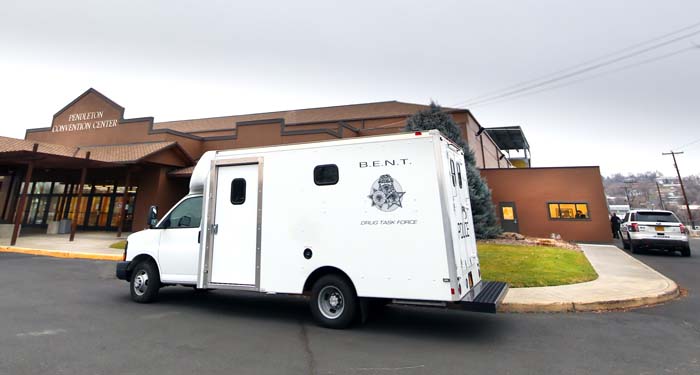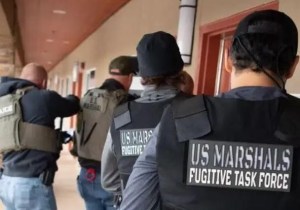Major drug bust puts strain on local foster care system
Published 5:45 pm Wednesday, February 27, 2019

- The Pendleton Convention Center served as a command and processing center for Operation Wildfire, a significant BENT drug bust that seized large amounts of drugs and involved at least 65 arrests.
Operation Wildfire, a January drug bust by the Blue Mountain Enforcement Narcotics Team, put 65 people from Umatilla, Morrow, Union and Gilliam counties behind bars. It also sent a wave of children into the foster care system.
Trending
According to Court Appointed Special Advocates, 38 children entered foster care in Umatilla County in January. At least eight families were involved with the drug bust, said Diane Shockman, the CASA volunteer coordinator for western Umatilla County.
“The reason kids were in danger is that non-safe people were frequenting their home, or they were in the car while mom or dad was selling drugs, reasons like that,” said Shockman.
Jesus Rome, the director of CASA, said the bust has had a trickle-down effect on families, with many kids taken away from home due to neglect. In his seven years at CASA, he said he’s never seen that many children come into foster care in a single month.
Trending
CASA works with a variety of organizations — including the Department of Human Services and the courts — as liaisons for foster care children.
“One day, we had six shelter hearings in Hermiston, and two in Pendleton,” he said. “Some had one child, but most had more than one.”
Shelter hearings, which are court proceedings that happen when a child is removed from their home, must be held within 24 hours of a child being removed. Because there was such a large influx of children coming into the system, Shockman said many people were rushing to make sure children had places to go.
“Caseworkers were scrambling to find homes and places to put them, the legal teams were processing paperwork, Judge Temple was having hearings,” she said.
Shockman said many of the children’s relatives stepped in and DHS was able to do emergency certifications so the children could stay with them.
Once a child is in foster care, there must be a discovery hearing within 30 days, and within 60 days they must have a jurisdictional hearing. At that time, the court also orders disposition, or determines where a child will be placed, as well as services for parent and child and visitation with family. Within the next six months, the court will have a permanency hearing to determine what the next step should be for the child.
Though they’ve been removed from their homes, Shockman said the goal is almost always to reunite children with their parents.
“It’s so variable,” she said, noting that sometimes, a parent can’t have contact with their child. But even if they’re incarcerated, she said, they make an effort to let the child visit.
“We really bend over backward to reunite kids with their parents,” she said. “It’s in the best interest of the kids. But the kids’ timeline is so short — we can’t always wait for parents to get their act together.”
She added that reunification is not a fast process. They need to be sure parents are serious before reuniting them with their children.
Charlie Clupny, a longtime CASA, said reunification is not always possible.
“I’m on a case where the kids were on a reunification track — then they were on a reunification/adoption track, and now they’re on an adoption track,” he said.
Clupny said in that case, the parent did not commit a violent crime. She had been doing well and on track to get her children back, but then had a death in her family that affected her so badly, it set her back. The parent was not actively abusing her children, but was neglecting them.
“Which most of the cases are,” Rome said. “Unfortunately with drugs, people use and sell for lots of different reasons. It’s great that the police departments were proactive in getting them off the street. But the ripple effect of people that get caught in the system, like this mom — they were doing so well but then they relapse again.”
The children in foster care as a result of Operation Wildfire have not yet been paired up with CASAs, as there are not enough to serve every child right now.
“It’s a struggle to recruit men and minorities,” he said. But he said the program has grown, and now has about 40 volunteers serving nearly 90 kids.









